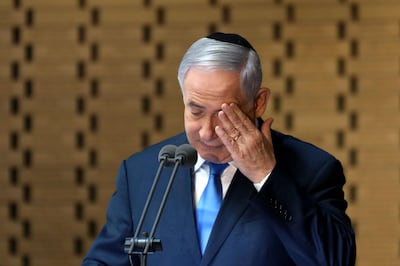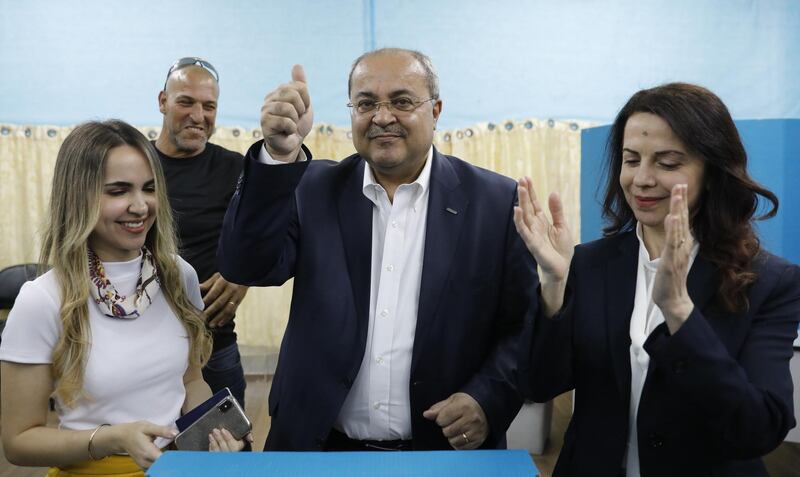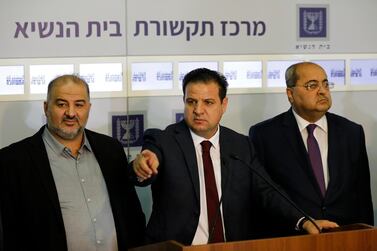For most of the international community, Israel is simply a state for the Jews. Very few visitors seem to care about meeting the indigenous Arab Palestinians living here and who make up more than 20 per cent of the country's population. Perhaps they don't want to see for themselves how the old western slogan of Israel being “Jewish and democratic” is a myth. But now that Palestinians comprise a significant percentage of the electorate, mainstream Zionist parties are trying to deprive us of our rights – including by using racist incitement. During his electoral campaign a few weeks ago, for instance, Prime Minister Benjamin Netanyahu said that the latest polls were about “Bibi or Tibi”.
Mr Netanyahu's failure to form a coalition government last week says it all. The Likud party he leads has failed to garner enough seats in the Knesset and the Joint List – the political alliance of the main Arab-majority political parties, of which I am a part of – is proud to have made this happen. It is still early to talk about the prospect of Benny Gantz, who leads the Blue and White party, to form a government. But we are prepared for any scenario – even if there is a call for a third election this year, one in which we are certain to win more seats even as Likud is set back even farther by the corruption scandals tainting the prime minister.
We Palestinians have realised that nobody will give us our rights if we do not work hard to claim them. Racism and institutionalised discrimination have been normalised, with international parties having essentially green-lighted the establishment of Jewish settlements in the Occupied Territories. Just look at the European Union's representative to Israel repeating lines such as “Israel and the EU share the values of democracy, human rights and the rule of law”. Even some of what the US ambassador to the country has said makes some members of Mr Netanyahu's administration seem like left-wing politicians. This helps to explain why no mainstream Jewish-Zionist party or alliance talks about peace or equality.
Aside from occupying Palestinian territories, there are more than 50 laws that discriminate against the non-Jewish populations. And yet countries such as France and Spain, and traditional friends of Palestine such as Ireland and Greece, still refuse to recognise the Palestinian state. Not one EU member-state labels settlement products and settlers enjoy visa exemptions to travel within the Schengen Area. Knowing that they will not be held accountable by the West, Israeli politicians therefore continue their systematic discrimination.

European countries have powerful tools with which to confront Israel, such as reviewing existing agreements and questioning the government's human rights record. But they seem unwilling to use them. To make things worse for the Palestinian cause, the world has seen the establishment of right-wing populist leaders such as Donald Trump and Viktor Orban who are trying to change the basic rules of the international system. Like Mr Netanyahu, these leaders are also setting dangerous precedents such as the acquisition of land through the use of force or open incitement and racism against their own citizens.
But we are seeing a pushback against such divisive politics in Israel. Only a few days after the latest elections, former defence minister Avigdor Lieberman said that members of the Joint List were not political opponents but "enemies". To this I responded by saying: "We are the sons and daughters of this land." It is a sentiment shared by almost 500,000 Palestinian citizens and Mr Lieberman's statement, among other statements of this nature, have helped mobilise the people and given the Joint List 13 seats in parliament. What we have achieved is significant and we have essentially told the people that we want to be active players in the country's politics – not just marginal ones. We are a transformative force indispensable to achieving regional stability. Our struggle is to end discrimination in all fields, help build a conducive environment for peace and end Israeli occupation through the establishment of the independent state of Palestine with East Jerusalem as its capital.
We have set an important precedent in the latest elections. We have unveiled Israel’s mainstream racism to everyone while contributing to the blocking of the so-called deal of the century, which is essentially Mr Trump’s plan to normalise Israel’s control over the Palestinians. But we need international support. We need, for instance, the Europeans to hold the Israeli government accountable and help us put an end to the government's ambition of establishing an apartheid state in the Middle East.
Dr Ahmad Tibi is the deputy speaker of the Knesset. He represents the Arab Joint List, the third largest political party in the Israeli parliament






